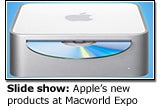




Integris CEO Glenn Mathis and CRO Kyle Wewe share how AI along with verticalization and acquisitions are shaping the future of MSPs in 2026.

Explore how Rafay Systems helps enterprises simplify hybrid cloud, Kubernetes, and AI workloads on AWS to improve governance, speed, and cost efficiency at scale.

Truly SMB’s CEO and CTO on how small and mid-sized businesses can adopt AI using Microsoft Copilot and a “tech fit” approach focused on real business outcomes.

A deep dive into the biggest IT channel stories of Q4 and all of 2025, including AI maturity, VMware and Broadcom changes, cybersecurity compliance, tech layoffs, and expert predictions for 2026.

Superhuman introduces itself as a unified AI productivity platform and launches the Superhuman Alliance partner program, outlining how partners can drive AI adoption, workflow automation, and measurable business outcomes.

Data41 founder Hans Mize explains how AI is transforming life sciences and social services, helping organizations deliver faster, more human-centered outcomes.

-
Channel Business -
Security -
AI -
Infrastructure Related Topics -
- Lists & Awards Top ArticlesLink to AI 50 List
 AI 50 ListChannel Insider's editorial team spotlights the top AI leaders from MSPs, vendors, and channel businesses delivering measurable outcomes.Link to CML 100 Honorees
AI 50 ListChannel Insider's editorial team spotlights the top AI leaders from MSPs, vendors, and channel businesses delivering measurable outcomes.Link to CML 100 Honorees CML 100 HonoreesCheck out our CML 100 List to discover the top channel marketing individuals who are transforming channel marketing for their organizations.Link to HSP 250 List
CML 100 HonoreesCheck out our CML 100 List to discover the top channel marketing individuals who are transforming channel marketing for their organizations.Link to HSP 250 List HSP 250 ListView our HSP250 list to see the top Hybrid Solution Providers that have proactively embraced the future of tech.Link to The 2024 Channel Insider VIP List
HSP 250 ListView our HSP250 list to see the top Hybrid Solution Providers that have proactively embraced the future of tech.Link to The 2024 Channel Insider VIP List The 2024 Channel Insider VIP ListChannel Insider sought nominations from IT vendors, solution providers, and partners to highlight impactful collaborations. Check out our top choices here.
The 2024 Channel Insider VIP ListChannel Insider sought nominations from IT vendors, solution providers, and partners to highlight impactful collaborations. Check out our top choices here. - Resources Resource HubsFeatured ResourcesLink to Video: Integris CEO and CRO on AI, Acquisitions, and How To Be an Irreplaceable MSP
 Video: Integris CEO and CRO on AI, Acquisitions, and How To Be an Irreplaceable MSP
Video: Integris CEO and CRO on AI, Acquisitions, and How To Be an Irreplaceable MSPIntegris CEO Glenn Mathis and CRO Kyle Wewe share how AI along with verticalization and acquisitions are shaping the future of MSPs in 2026.
Link to Video: How Rafay Systems Simplifies Hybrid Cloud & AI on AWS Video: How Rafay Systems Simplifies Hybrid Cloud & AI on AWS
Video: How Rafay Systems Simplifies Hybrid Cloud & AI on AWSExplore how Rafay Systems helps enterprises simplify hybrid cloud, Kubernetes, and AI workloads on AWS to improve governance, speed, and cost efficiency at scale.
Link to Video: How Truly SMB Helps Small to Midsize Businesses Adopt AI Video: How Truly SMB Helps Small to Midsize Businesses Adopt AI
Video: How Truly SMB Helps Small to Midsize Businesses Adopt AITruly SMB’s CEO and CTO on how small and mid-sized businesses can adopt AI using Microsoft Copilot and a “tech fit” approach focused on real business outcomes.
Link to Video: Q4 and 2025 Annual IT Channel Recap: AI, VMware, Security & 2026 Outlook Video: Q4 and 2025 Annual IT Channel Recap: AI, VMware, Security & 2026 Outlook
Video: Q4 and 2025 Annual IT Channel Recap: AI, VMware, Security & 2026 OutlookA deep dive into the biggest IT channel stories of Q4 and all of 2025, including AI maturity, VMware and Broadcom changes, cybersecurity compliance, tech layoffs, and expert predictions for 2026.
Link to Video: Grammarly Rebrands as Superhuman, Launches Superhuman Alliance Partner Program Video: Grammarly Rebrands as Superhuman, Launches Superhuman Alliance Partner Program
Video: Grammarly Rebrands as Superhuman, Launches Superhuman Alliance Partner ProgramSuperhuman introduces itself as a unified AI productivity platform and launches the Superhuman Alliance partner program, outlining how partners can drive AI adoption, workflow automation, and measurable business outcomes.
Link to Video: How Data41 Uses AI to Transform Life Sciences & Social Good Video: How Data41 Uses AI to Transform Life Sciences & Social Good
Video: How Data41 Uses AI to Transform Life Sciences & Social GoodData41 founder Hans Mize explains how AI is transforming life sciences and social services, helping organizations deliver faster, more human-centered outcomes.
- About About










